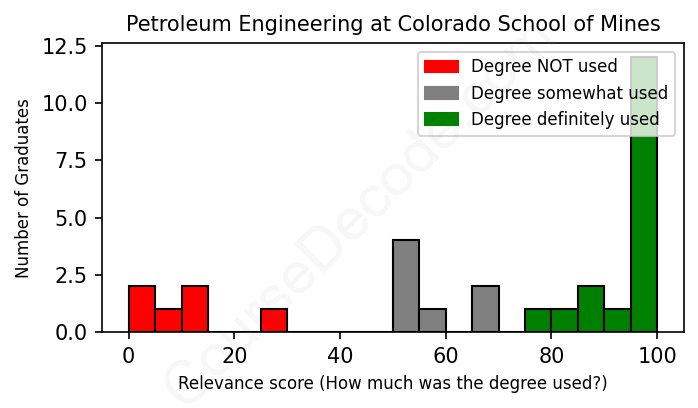
First, some facts. Of the Petroleum Engineering graduates from Colorado School of Mines we've analyzed , here's how many have used (or NOT used) their degree in their career:

These are estimates based on AI analysis of 30 LinkedIn profiles (see below).
The verdict? Slightly above average. Overall, with an average relevance score of 69%, Petroleum Engineering graduates from Colorado School of Mines have a slightly higher likelihood (+2%) of finding work in this field compared to the average graduate across all fields:
And for comparison, here's the chart for all profiles we've looked at across all degrees.
Also, after graduating, only 16% of these graduates have pursued further education other than another Bachelor's degree (such as a Masters degree or other), compared to the average across all profiles of 35%. This suggests a Bachelors degree is enough for most Petroleum Engineering graduates, and it's normal to look for work straight after graduation.
See the details:
|
Relevance score: 26% We think this person has NOT gone into a career related to their degree. We think this person has NOT gone into a career related to their degree.
DEGREE INFOGraduated in 2017 from Colorado School of Mines with a Bachelor of Applied Science (B.A.Sc.) in Petroleum Engineering. Also pursued further education since (see below). JOB HISTORY SINCE GRADUATIONLoss Prevention Analyst AIG Jul 2017 - Jun 2019 Production Operator  Covenant Testing Technologies, LLC Jan 2020 - Jul 2021 Software Engineering Immersive  General Assembly Sep 2021 - Dec 2021 Software Developer  Woodridge Software (acquired by RCG Global Services) Mar 2022 - Dec 2023 Software Developer  RCG Global Services Mar 2022 - Sep 2023 Senior Software Developer  RCG Global Services Sep 2023 - Feb 2024 FURTHER DEGREES DONE SINCE GRADUATINGCertificateGeneral Assembly 2021 - 2021 ABOUTFull-stack software engineer with a background in petroleum engineering and commercial property risk analysis. My experience affords me a unique perspective when approaching development. I love collaborating with others to transform ideas into actualities. My skills include:HTML | CSS | Sass | JavaScript | jQuery | Express | Node | React | MongoDB | Mongoose | Python | Java | Excel Visual Basic | Git | GitHub |
The top 10 most common jobs done by the graduates we've analyzed (ranked most common to least) are:
When looking at the job paths of graduates from Colorado School of Mines with a Petroleum Engineering degree, it's clear that many went into roles closely aligned with their field of study. A significant number of these individuals landed positions like Petroleum Engineer, Field Engineer, Reservoir Engineer, and various engineering roles within reputable companies like Baker Hughes and Halliburton. These jobs often required they put their engineering knowledge and technical skills to work in practical settings, such as drilling, production, and reservoir management. Roles like these use the critical concepts taught in petroleum engineering programs every day, so it makes sense that those who pursued these positions found high relevance to their academic background.
However, not every graduate stuck with core petroleum engineering roles. Some ventured into areas like project management, business development, and even legal professions, which, while occasionally benefiting from an engineering background, do not require the specific petroleum engineering expertise one would gain from their degree. Positions like Project Manager at InterContinental Lighting Solutions or Legal Counsel at MPLX GP LLC demonstrate a drift away from the core focus of petroleum engineering. This mix shows that while many graduates do find relevant careers straight out of school, others take a different route, possibly leaning into management or other industries that utilize their problem-solving skills more generally then directly applying petroleum engineering knowledge.
Here is a visual representation of the most common words in job titles for Petroleum Engineering graduates (this is across all Petroleum Engineering graduates we've analyzed, not just those who went to Colorado School of Mines):

The graduates from Colorado School of Mines with a degree in Petroleum Engineering typically follow strong career pathways that align closely with the oil and gas sector. Right after graduating, many find jobs as field engineers or in various technical roles, often starting at major companies like Halliburton, Baker Hughes, or ConocoPhillips. These positions usually involve hands-on work in the field, which allows them to gain valuable experience quickly. For instance, graduates from the class of 2010 often took up roles like Petroleum Engineer or Field Engineer, setting a solid foundation for their careers. Those who graduated a few years later, such as in 2013 and 2014, also began their careers in similar technical positions, focusing on production and completions engineering, which are crucial functions in the oil and gas industry.
Looking five to ten years down the line, many of these professionals tend to climb the ranks within their companies or shift into specialized roles. For example, a graduate from 2013 progressed from a field engineer at Halliburton to a Senior Completions Engineer at Antero Resources, reflecting a well-defined trajectory in technical and management roles. However, it’s also noteworthy that some graduates choose alternative paths, eventually moving into business development, finance, or even unrelated fields like software engineering. Despite these diversions, a significant majority remain in the oil and gas sector, often transitioning into higher-level positions such as reservoir engineers, project managers, or technical leads. Overall, graduates from Colorado School of Mines generally find success in their fields, demonstrating that a Petroleum Engineering degree can lead to a robust and rewarding career. The skills they acquire can be valuable not just in engineering but across various related industries as well.
Getting a Bachelor’s degree in Petroleum Engineering at the Colorado School of Mines is definitely on the challenging side, and it’s not for the faint of heart! You’re diving into some pretty tough subjects like thermodynamics, fluid mechanics, and geology, all while learning how to solve real-world engineering problems. The coursework can be rigorous, and you’ll spend a lot of time working on projects and labs that require both teamwork and critical thinking skills. While some people might breeze through it if they’re passionate about the field and have a solid math and science background, others might find it a bit overwhelming. So, if you’re ready to put in the hard work and stay committed, it can be a really rewarding experience, but don’t underestimate the effort it requires!
Most commonly, in the LinkedIn profiles we've looked at, it takes people 4 years to finish a Bachelor degree in Petroleum Engineering.
Looking at the career paths of these Petroleum Engineering grads from Colorado School of Mines, it seems like many of them have done pretty well financially, especially those who stuck within the oil and gas industry. Positions like Senior Production Engineer and Drilling Engineer usually come with solid salaries, thanks to the demand for skilled workers in the field. Some even transitioned to roles at major companies like Halliburton and ConocoPhillips, which are known for paying well. Of course, there's some variation; not everyone is raking in the big bucks—like those who shifted to roles less focused on petroleum or went into different industries entirely. But overall, it looks like they generally found good opportunities to make a decent living after college.
Here is a visual representation of the most common words seen in the "about" section of LinkedIn profiles who have a Bachelor degree in Petroleum Engineering (this is across all Petroleum Engineering graduates we've analyzed, not just those who went to Colorado School of Mines). This may or may not be useful:

Here are all colleges offering a Bachelor degree in Petroleum Engineering (ordered by the average relevance score of their Petroleum Engineering graduates, best to worst) where we have analyzed at least 10 of their graduates:
| College | Score | Count |
|---|---|---|
 Texas A&M University Texas A&M University
|
80 | 25 |
 Louisiana State University Louisiana State University
|
79 | 26 |
 University of Oklahoma University of Oklahoma
|
78 | 20 |
 Texas Tech University Texas Tech University
|
77 | 20 |
 Penn State University Penn State University
|
75 | 11 |
 The University of Texas at Austin The University of Texas at Austin
|
75 | 18 |
 Marietta College Marietta College
|
70 | 20 |
 Colorado School of Mines Colorado School of Mines
|
69 | 30 |
 West Virginia University West Virginia University
|
68 | 10 |
 University of Houston University of Houston
|
67 | 19 |
 University of Louisiana at Lafayette University of Louisiana at Lafayette
|
63 | 10 |